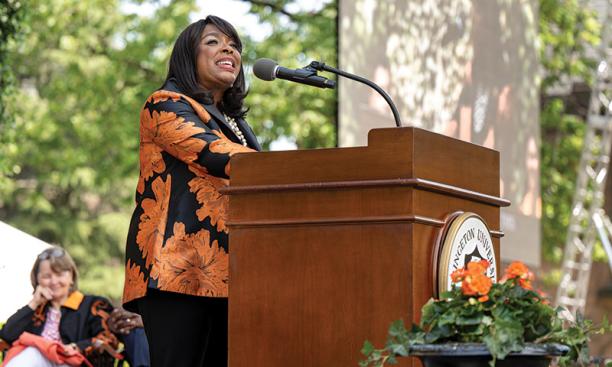
In the tradition of writing a senior thesis that foreshadows career goals, Class Day speaker Terri Sewell ’86 titled hers “Black Women in Politics: Our Time Has Come.” At that point, she had won just one election, to become vice president of her Princeton class. Today, Sewell is in her seventh term in Congress, representing her hometown of Selma, Alabama, and the surrounding region.
Sewell’s advice to the Class of 2023 drew heavily on her connection to Selma. After completing Harvard Law School, she joined a prestigious New York City firm (she had student loans to repay), but she eventually returned home — and she encouraged graduates to consider doing the same.
“My mother said, ‘Bloom where you’re planted,’” Sewell said. “Each of you comes from somewhere that would be better served by your help, your service. You know your communities — the schools, the churches, small businesses on Main Street. You know the problems. You know the potential. You can make a difference.”
In an interview after the ceremony, Sewell expanded on that idea. “I get that my district is the poorest district in the state of Alabama,” she said. “But if anybody knows what’s possible from that district, if anyone shares their frustration with the lack of resources and the lack of opportunities in that district, it’s a person who grew up in that district.”
This year’s graduates also received parting wisdom from a Baccalaureate speaker who dispenses advice on a weekly basis, NYU philosophy and law professor Kwame Anthony Appiah, author of the Ethicist column in The New York Times Magazine.
Appiah, an emeritus professor at Princeton, urged the class to “pay attention, just for a moment, to attention itself” in a wide-ranging talk that covered academia, art, love, artificial intelligence, and social justice.
“To come to grips with what we owe to each other, we have to see each other,” Appiah said. “We have to recognize that a person sleeping on the street is, first and foremost, a person. When you don’t see poor people, when you don’t see refugees, when you don’t see abuse, when you don’t see discrimination, what’s happening can be described, morally, as an attention deficit.”
